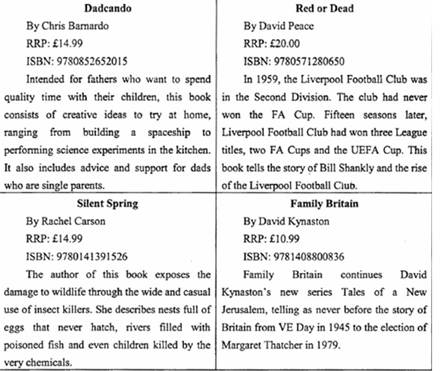
科目: 來源: 題型:閱讀理解
查看答案和解析>>
科目: 來源: 題型:閱讀理解
查看答案和解析>>
科目: 來源: 題型:閱讀理解
Inside China Daily
| China, Japan ink fishery agreement The New China-Japan Fishery Agreement will be put into effect starting June this year. Chinese vice-minister of agriculture, Qi Jingfa told a press conference yesterday in Beijing. -Page 2 Offshore funeral(葬禮) The remains of more than 500 dead will be scattered at sea this spring near the mouth of Yangtze River in Shanghai. To save space Shanghai officials discouraged land burials. –Page 3 The only wise choice Co-operation with the mainland for a peaceful reunification (統(tǒng)一) should be the only wise choice for the newly elected Taiwan leader. -Page 4 The Art Market Interest in activities such as fairs, galleries and exhibitions has caused the art market to take shape in China. -Page 9 Two sides of a story The government’s efforts to cut the homework burden of primary and middle school students have drawn mixed reactions. -Page 10 Blind, but not out. Yang Jia, an English professor at the Chinese Academy of Science meets the challenges brought by the sudden loss of her eyesight and continues to make it in her work. -Page 11 |
查看答案和解析>>
科目: 來源: 題型:閱讀理解

查看答案和解析>>
科目: 來源: 題型:閱讀理解
查看答案和解析>>
科目: 來源: 題型:閱讀理解
Have you ever considered all the English expressions that include words about clothes? Let’s see if I can name a few proverbs “off the cuff” since I haven’t prepared for it.
| English expressions with “pants” |
| People wear pants to cover the lower part of their bodies. We sometimes say that people who are restless or nervous have “ants in their pants.” They might also “fly by the seat of their pants” -- they use their natural sense to do something instead of their learned knowledge. Sometimes, people may “get caught with their pants down” -- they are found doing something they should not be doing. And, in every family, one person takes control. Sometimes a wife tells her husband what to do. Then we say “she wears the pants in the family.” |
| When people what to say something about money |
| Pants usually have pockets to hold things. Money that is likely to be spent quickly can “burn a hole in your pocket.” Sometimes you need a belt to hold up your pants. If you have less money than usual, you may have to “tighten your belt” -- you may have to live on less money and spend your money carefully. But once you have succeeded in budgeting your money, you will have that skill “under your belt.” I always praise people who can save their money and not spend too much. I really “take my hat off to them.” Yet, when it comes to my own money, I spend it “at the drop of a hat” -- immediately, without waiting. And sadly, you cannot “pull money out of a hat” -- you cannot get money by inventing or imagining it. |
| English expressions with “shoes” |
| Boots are a heavy or strong kind of shoes. People who are “too big for their boots” think they are more important than they really are. I dislike such people. I really do. You can bet your boots on that! Yet, truly important people are hard to replace. Rarely can you “fill their shoes” -- or replace them with someone equally effective. |
| English expressions with “shirt” |
| My father is an important person. He runs a big company. He wears a suit and tie and a shirt with sleeves that cover his arms. Some people who do not know him well think he is too firm and severe. They think he is a real “stuffed shirt.” But I know that my father “wears his heart on his sleeve” -- he shows his feelings openly. And, he knows how to “keep his shirt on” -- he stays calm and never gets angry or too excited. |
查看答案和解析>>
科目: 來源: 題型:閱讀理解
查看答案和解析>>
科目: 來源: 題型:閱讀理解
查看答案和解析>>
科目: 來源: 題型:閱讀理解
查看答案和解析>>
科目: 來源: 題型:閱讀理解
查看答案和解析>>
湖北省互聯(lián)網(wǎng)違法和不良信息舉報(bào)平臺(tái) | 網(wǎng)上有害信息舉報(bào)專區(qū) | 電信詐騙舉報(bào)專區(qū) | 涉歷史虛無主義有害信息舉報(bào)專區(qū) | 涉企侵權(quán)舉報(bào)專區(qū)
違法和不良信息舉報(bào)電話:027-86699610 舉報(bào)郵箱:58377363@163.com